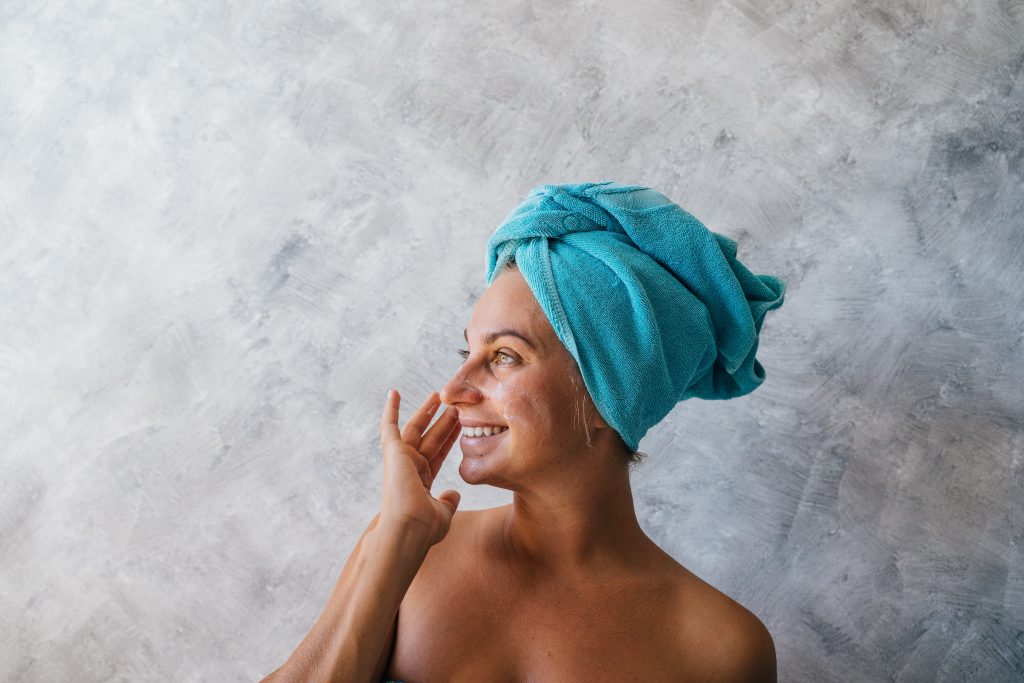Dr Sonnenberg discusses more about menopause, skin and hair with Dr Mandy Leonhardt, in detail in the instagram live interview linked below.
We highly recommend you buy the recommended book which goes into great detail about how the hormonal changes affect skin and hair. It covers the basics of healthy skin, hair and nails and how this changes as we age. It discussed how different hormones affect skin and hair and how this varies from puberty and adolescence to post-menopause. It talks about sun exposure, alcohol, smoking, stress, nutrition and exercise and how these affect skin. It talks about looking after skin, cleansing, exfoliating, moisturising and sun screen and how to look after your hair, washing and conditioning.
Instagram live with Dr Mandy Leonhardt: What every woman needs to know about her skin and hair by Dr Mandy Leonhardt
Dr Leonhardt’s top two tips:
- A moisturiser you love, it does not have to be expensive
- High factor sunscreen and cover your skin from the sun
This chapter interested us very much.
The role of the different hormones
- Serotonin: regulates melanin production in melanocytes, protects against UVB damage, supports fibroblast proliferation
- Melatonin: antioxidant, anti-inflammatory, supports immune function, increased hair growth and supports hair follicle function, supports keratinocyte and fibroblast functions, repairs DNA, protects skin from harmful effects of UV light, reduces melanin production
- Glucocorticoids (cortisol, etc.): antiinflammatory – but chronically high levels can dampen benefits of inflammation, stimulate sebum production (steroid acne), decrease fibroblast growth – reduce collagen, induce skin thinning when levels are high (atrophy)
- Testosterone: generally beneficial for hair growth, can get turned into DHT through an enzyme in the skin and other tissues, promotes sebum production in the skin – high levels can cause oily skin, greasy hair, regulates tear glands and keeps eyes moist
- Oestrogen: increases moisture levels in the skin by increasing mucopolysaccharides, supports production of hyaluronic acid which is able to hold onto water and keep skin plump and hydrated, supports production of ceramide’s which increase moisture in the skin and support a healthy skin barrier, supports wound healing, anti-inflammatory, promotes melanin production, stimulates hair growth on the scalp and extends hair growth phase, high levels suppress sebum production.
- Adrenalin / noradrenalin: increases melanin production, can reduce hair pigmentation
Food for skin, hair and nails
- Protein: required for skin repair, hair growth, energy supply, immune function (peas, soy, quinoa, chia seeds, eggs, fish and other animal derived protein)
- Copper: helps cells to produce proteins, supports the function of healthy blood vessels, supports healthy nails (potatoes, cashew nuts, dark chocolate, shellfish like oysters and mussels)
- Zinc: the skin contains around 6% of the body’s zinc, increases cell turnover, essential for hair growth, antioxidant properties, supports skin’s immune system, supports growth of healthy nails (pumpkin seeds, hemp seeds, chickpeas, cashew nuts, whole grains, mushrooms – maitake, mussels, shellfish and eggs)
- Iron: supports enzymes which are important for the skins antioxidant system, important for hair growth (dried apricots, beans, like kidney beans, edamame, chickpeas, chicken thigh, red meat)
- Selenium: essential for development and functioning of skin cells, supports the skins antioxidant system, needed for healthy nails (Brazil nuts, seafood)
- Vitamin A: prevent skin aging (yellow fruits like mango, papaya, apricots; yellow and red vegetables, carrots, sweet potatoes, yellow peppers)
- Vitamin C: involved in collagen synthesis, antioxidant – eliminates free radicals (citrus fruits, kiwi fruit, bell peppers, potatoes etc.)
- Vitamin D: reduces skin DNA damage, reduces inflammation, supports hair growth, (mushrooms)
- Omega 3 and omega 6 fatty acids: plays an important role in skin barrier function, reduce skin inflammation (oily fish, like sardines, olive oil)
- Biotin: important for hair growth metabolism, involved in fatty acid synthesis (eggs, seeds, nuts, sweet potatoes)
- Polyphenols: act as antioxidants, an important compound to slow down skin aging, anti-inflammatory, produce oxidative damage, increase collagen synthesis, can prevent sunburn (turmeric / curcumin, red and purple berries, red grapes, green tea, dark chocolate, whole grains, peanuts)
- Vitamin E: antioxidant, neutralises free radicals in the skin cell membranes (wheat germ oil, sunflower seeds, almond, peanuts)
- Magnesium: support mitochondrial function, support hair and nail growth (leafy green vegetables, legumes, nuts, and seeds, whole grains)
- Lycopene: helps protect skin from the harmful effects of UV light (tomatoes – the lycopene bioavailability, is higher in cooked tomato products such as tomato sauce or tomato ketchup)
Also covered, should we take a collagen supplement? see page 241. Dr Leonhardt’s verdict is that evidence is currently not robust enough to recommend collagen supplements as a remedy to treat or slow down skin ageing.
Thank you Dr Leonhardt, this is just a small amount of information included in the book which is so helpful so do buy or borrow it to read more.
To make an appointment at Rowena Health Menopause Clinic to talk about all the changes happening in your body at midlife please click on the link. We offer care for women all over the UK online and in person at our Guildford Clinic.
Menopause, skin and hair and nails Last updated September 2023 Dr Carys Sonnenberg


